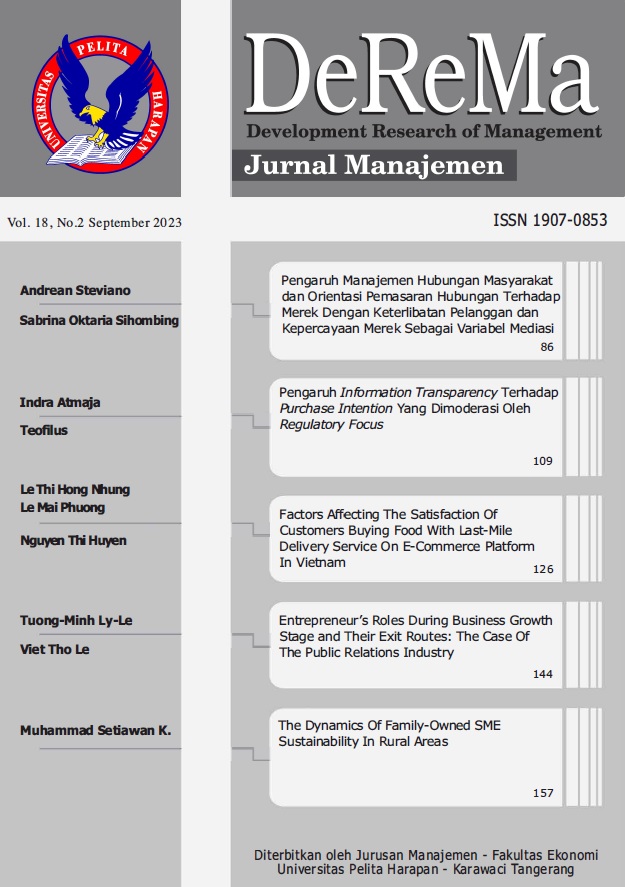THE DYNAMICS OF FAMILY-OWNED SME SUSTAINABILITY IN RURAL AREAS [DINAMIKA KEBERLANJUTAN UKM KELUARGA DI PEDESAAN]
DOI:
https://doi.org/10.19166/derema.v18i2.6727Schlagworte:
family business, family-owned SME, rural, SME, successionAbstract
SMEs in rural areas have characteristics that are closely related to the character of a family business. This can be seen in the management of the SME business which is fully controlled by the family. This situation shows that SMEs in rural areas are more dominated by family-owned SMEs. As a family-owned SME, this village entrepreneur has a big challenge to be able to regenerate the business for the next generation. This study seeks to identify the things that affect the dynamics in realizing the sustainability of family-owned SMEs in the village. This study uses a qualitative approach by conducting interviews through purposive sampling to culinary informants who run their businesses in rural areas and have the next generation. The results of the study show that in addition to all SMEs in the village being dominated by family businesses, these SMEs have hopes that their families will continue their business, but on the other hand it was also found that there are SMEs who do not care who will continue their business. This study produces interesting findings that can be developed to help improve the sustainability of SME development in Indonesia.
Abstrak dalam Bahasa Indonesia. UKM di pedesaan memiliki karakteristik yang erat kaitannya dengan karakter usaha keluarga. Hal ini terlihat dari pengelolaan usaha UKM yang sepenuhnya dikendalikan oleh keluarga. Keadaan ini menunjukkan bahwa UKM di pedesaan lebih didominasi oleh UKM milik keluarga. Sebagai UKM milik keluarga, pengusaha desa ini memiliki tantangan besar untuk bisa meregenerasi bisnisnya untuk generasi selanjutnya. Kajian ini berupaya mengidentifikasi hal-hal yang mempengaruhi dinamika dalam mewujudkan keberlanjutan UKM milik keluarga di desa. Penelitian ini menggunakan pendekatan kualitatif dengan melakukan wawancara melalui purposive sampling kepada informan kuliner yang menjalankan usahanya di pedesaan dan memiliki generasi penerus. Hasil kajian menunjukkan bahwa selain seluruh UKM yang ada di desa didominasi oleh usaha keluarga, UKM ini memiliki harapan agar keluarganya tetap melanjutkan usahanya, namun disisi lain juga ditemukan adanya UKM yang tidak peduli yang akan melanjutkan usahanya. Kajian ini menghasilkan temuan menarik yang dapat dikembangkan untuk membantu meningkatkan keberlanjutan pengembangan UKM di Indonesia.
Literaturhinweise
Agustiono, A., & Wijaya, C. (2018). Building Trust in Family Business. Jurnal Entrepreneur Dan Entrepreneurship, 7(2), 49-54. https://doi.org/10.37715/jee.v7i2.1103
Bertschi-Michel, A., Sieger, P., & Kammerlander, N. (2019). Succession in family-owned SMEs: the impact of advisors. Small Business Economics, 56, 1531-1551. https://doi.org/10.1007/s11187-019-00266-2
Elisa, A. F., & Santoso, E. B. (2017). Arahan Pengembangan Sentra Industri Alas Kaki di Kelurahan Kemasan Kecamatan Krian Kabupaten Sidoarjo Melalui Pendekatan Pengembangan Ekonomi Lokal. Jurnal Teknik ITS, 6(2). https://doi.org/10.12962/j23373539.v6i2.24911
Farrington, S. M. (2014). A comparative study of the entrepreneurial orientation of small family and small non-family businesses. Management Dynamics : Journal of the Southern African Institute for Management Scientists, 23(2).
Gandhatama, L., & Efferin, S. (2016). Rancangan Bentuk Kepemilikan Bisnis Keluarga Pt X Untuk Menjaga Keberlangsungan Di Masa Depan. Calyptra, 5(1), 1-21. https://journal.ubaya.ac.id/index.php/jimus/article/view/2735
Giménez, E. L., & Novo, J. A. (2020). A Theory of Succession in Family Firms. Journal of Family and Economic Issues, 41(1), 96-120. https://doi.org/10.1007/s10834-019-09646-y
Hall, A., & Nordqvist, M. (2008). Professional management in family businesses: Toward an extended understanding. Family Business Review, 21(1), 51-69. https://doi.org/10.1111/j.1741-6248.2007.00109.x
Hans S.R, E., Ilmawan, M. D., & Wardhana, A. N. (2018). Motivation of Fresh Graduate Students Who Leave a Family Business. Jurnal Manajerial, 5(2), 12-26.
Heryjanto, A. (2018). Bisnis Keluarga Tanpa “Putera Mahkota.” Journal of Business & Applied Management, 11(1), 68-80. https://doi.org/10.30813/jbam.v11i1.1075
Itan, I., & Lestari, W. D. (2015). Implikasi Corporate Governance Terhadap Kinerja Family Business di Indonesia. Jurnal Ipteks Terapan, 1, 76-87.
Medisa, R., & Syahputra. (2019). Faktor Perencanaan Suksesi Generasi Pertama Berbasis Family Business Enterprise (Studi Kasus pada Toko Emas di Kota Bandung). Jurnal Sekretaris & Administrasi Bisnis (JSAB), 3(2), 113. https://doi.org/10.31104/jsab.v3i2.117
Merchant, P., Kumar, A., & Mallik, D. (2018). Factors Influencing Family Business Continuity in Indian Small and Medium Enterprises (SMEs). Journal of Family and Economic Issues, 39(2), 177-190. https://doi.org/10.1007/s10834-017-9562-3
Nawrocki, T. (2005). Family affair: The emotional issues of succession planning. Journal of Financial Planning, 18(7), 34-39.
Nugroho, R. L. (2016). Family Business: An Entrepreneurial Longer-Term Perspective. Binus Business Review, 7(1), 9. https://doi.org/10.21512/bbr.v7i1.1428
Purba, J. T., & Tan, J. D. (2018). Owners ’ integrity , customers ’ relation , and focused attitude as strategies as family business sustainability and growth : an empirical study. Journal of Economics, Business, and Accountancy Ventura, 21(2). https://doi.org/10.14414/jebav.v21i2.1433
PWC. (2014). Survey Bisnis Keluarga 2014.
Rahayu, D. P., & Akbari, D. A. (2018). Coaching Marketing Online dan Pencatatan Keuangan Terpadu Usaha Mikro dan Kecil Menengah (UMKM) pada Yayasan Tugas Ibu Tangerang Selatan. Syukur: Jurnal Inovasi Sosial Dan Pengabdian Kepada Masyarakat, 1(1), 77-80. https://doi.org/10.22236/syukur
Saleh, R., Oktafiani, I., & Sitohang, M. Y. (2021). Sulitnya Regenerasi Petani pada Kelompok Generasi Muda. Jurnal Studi Pemuda, 10(1), 1. https://doi.org/10.22146/studipemudaugm.62533
Saputra, N. (2017). Development of Leadership Based on Value on Family Company To Sustain the Business Success From Generation To Generation. Jurnal Aplikasi Manajemen, 15(3), 380-388. https://doi.org/10.21776/ub.jam.2017.015.03.03
Subagio, D. K. (2017). Analisis Risiko Bisnis Dan Risiko Keuangan Perusahaan Keluarga Sektor Industri Barang Konsumsi. David, 53(9), 1689-1699.
Supriadi, A. (2014). PWC: 95 Persen Perusahaan Indonesia adalah Bisnis Keluarga. CNN Indonesia. https://www.cnnindonesia.com/ekonomi/20141202100356-92-15176/pwc-95-persen-perusahaan-indonesia-adalah-bisnis-keluarga
Wahjono, S. I., Hanim, H., Saleh, H., & Marina, A. (2015). Factors That Influence Performance of Family Business in Melaka, Malaysia. Balance, XII(2), 1-7.
Ward, J. L. (2004). Perpetuating the Family Business: 50 Lessons Learned from Long-Lasting, Successful Families in Business. International Small Business Journal, 22(6). https://doi.org/10.1177/026624260402200609
Wardhana, D. Y. (2018). Good Corporate Governance Practices in Family Business: A Case Study in Indonesia. Petra International Journal of Business Studies, 1(1), 35-44. https://doi.org/10.9744/ijbs.1.1.35-44
Zulganef, Z., & Nilasari, I. (2022). Building Service Experience to Attain Customer Repurchase Intention: A Moderated-Mediation Model in the Context of Student Consumer in Indonesia. DeReMa (Development Research of Management): Jurnal Manajemen, 17(2), 147. https://doi.org/10.19166/derema.v17i2.5867
Downloads
Veröffentlicht
Ausgabe
Rubrik
Lizenz
Authors who publish with this journal agree to the following terms:
1) Authors retain copyright and grant the journal right of first publication with the work simultaneously licensed under a Creative Commons Attribution License (CC-BY-SA 4.0) that allows others to share the work with an acknowledgement of the work's authorship and initial publication in this journal.
2) Authors are able to enter into separate, additional contractual arrangements for the non-exclusive distribution of the journal's published version of the work (e.g., post it to an institutional repository or publish it in a book), with an acknowledgement of its initial publication in this journal.
3) Authors are permitted and encouraged to post their work online (e.g., in institutional repositories or on their website). The final published PDF should be used and bibliographic details that credit the publication in this journal should be included.





